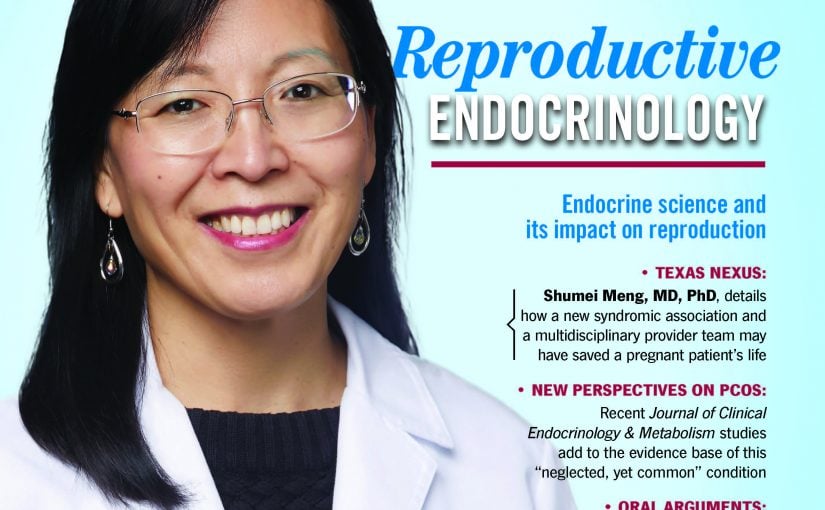
While Alexander Kauffman, PhD, and his laboratory try to unlock the secrets of puberty, his lab provides a once-in-a-lifetime opportunity to underprivileged interns, allowing them to unlock the secrets to their own scientific discoveries.
Alexander Kauffman, PhD, is an associate professor in the Department of Reproductive Medicine at the University of California San Diego. He started the Kauffman Lab in 2009 to study how the brain and hormones coordinate the control of reproduction and the reproductive system. His lab is working on many projects, but on the day Endocrine News caught up with him, Kauffman just received notice of his new five-year NIH Research Grant (R01) to continue his work on the brain’s role in puberty.
Endocrine News: So what do we know so far about why puberty kicks in at certain ages?
Alexander Kauffman: No one has a clue. Why do girls go through puberty at age 10 or 11? Why do boys go through puberty at 12 or 13, and by extension, why do boys begin puberty later than girls?
So, the main questions that we’re going to study are what parts of the brain are involved in regulating normal puberty, how does this differ between males and females, and what are the specific molecular and cellular players involved, whether they’re the proteins or neurotransmitters? What specific factors are involved, and where and when is this happening in the brain?
We have some exciting preliminary evidence and now we want to get into the brain and study the specific brain areas that are influencing puberty to see when and how they “work.” Also, can this inform us about causes of reproductive pubertal disorders? There are some pubertal disorders, one of which is called precocious puberty (puberty at age 7 or even much earlier). That disorder is very unfortunate, and it, interestingly, afflicts girls more than boys. So, again, we have this very interesting pubertal sex difference.
We have some exciting preliminary evidence and now we want to get into the brain and study the specific brain areas that are influencing puberty to see when and how they “work.”
We study this in mouse models, so it’s not human clinical studies, it’s more translational research. But this allows us to use some cutting-edge genetic and molecular techniques in numerous mouse models to tease this all apart and get into the brain. We can look at what’s changing in the brain or intentionally change the brain to see if we can alter puberty.
EN: What other fascinating reproductive mysteries are you researching?
AK: We have another grant from the National Science Foundation (NSF) on how stress inhibits reproduction. As it does with our animal models, women who are chronically stressed have trouble conceiving. Their menstrual cycles can shut off and they fail to ovulate in some cases. We know this is due to stress and stress hormones, but we don’t know how this works. In the future, if someone can’t conceive and has very high stress hormone levels, the dream is to develop a treatment that would be able to block that inhibition. We actually just published a paper on the topic of stress and infertility (JA Yang et al., Endocrinology, 2017).
EN: How many researchers are in your lab searching for these answers?
Kauffman: I typically have two to three postdocs and a lab tech, and then I always have a lot of undergrads getting their hands and feet wet for the first time in research. Also, for multiple years now, I’ve run outreach programs to local high schools so sophomores or juniors can get direct exposure to lab research techniques and do in-depth internships for multiple weeks. In almost all cases, the high schoolers are underrepresented minorities from financially disadvantaged backgrounds. Sometimes their parents have never gone to college, so they would be the first in their families to do so. Our program puts them in the lab, puts pipettes in their hand, and gets them cutting brain tissue, analyzing DNA samples, generating data, and seeing what it’s like to be a scientist. As you know, we need more minorities in science, and it’s always a struggle to figure out ways we can achieve this.
The main questions that we’re going to study are what parts of the brain are involved in regulating normal puberty, how does this differ between males and females, and what are the specific molecular and cellular players involved, whether they’re the proteins or neurotransmitters?
At the end of every internship, the high schoolers give a presentation back at their school, and it’s emotional. Several have been in tears about how much they learned about themselves and about this opportunity, and it’s very fulfilling.
Glenda Fauntleroy is a Carmel, Ind.-based freelance writer and regular contributor to Endocrine News. She wrote about the value of postdocs in last month’s column.

